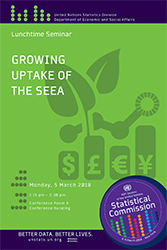United Nations Statistical Commission
Overview 49th Session (2018) Side Events
Growing Uptake of the SEEA
- Monday, 5 MAR 2018
- 1:15 – 2:30 pm
- Conference Room 11
Meeting organized by United Nations Statistics Division
As an integrated framework supporting the measure of sustainable development, the System of Environmental-Economic Accounting (SEEA) plays an important role in the 2030 Agenda for Sustainable Development and the Sustainable Development Goal (SDG) indicators. In reflection of this, the UN Statistical Commission at its 46th session in 2015 'Urged the Committee of Experts to advocate for and promote the scaling up of its implementation programme, exercising strong leadership in developing a concrete and well-resourced programme to support countries in implementing SEEA, with a clear timeline of objectives and deliverables'. In response, the UN Committee of Experts on Environmental-Economic Accounting (UNCEEA) updated its implementation strategy to place the SEEA implementation in the broader context of the current statistical agenda, particularly in view of the UN Statistical Commission's adoption of the global indicator framework for the SDGs.
The updated implementation strategy aims to better respond to implementation needs by anchoring the strategy in the new policy environment and making deeper links to policy initiatives in addition to the SDGs, such as green economy/green growth, sustainable consumption and production and sustainability reporting by businesses. The strategy also reflects the central role that the SEEA plays in emerging statistical initiatives, such as the transformative agenda and the modernization of the statistical system, as well as big data in support of official statistics. In addition, the updated strategy extends coverage beyond the SEEA Central Framework to also include SEEA Experimental Ecosystem Accounting. The comprehensive nature of the implementation strategy reflects the holistic approach of developing an information system in support of sustainable development.
The updated strategy recommends the following targets for SEEA implementation by 2020:
- At least 100 countries with ongoing, well-resourced programmes in SEEA Central Framework accounting; and
- At least 50 countries with ongoing, well-resourced programmes in ecosystem accounting to support national decision-making;
The 2017 Global Assessment of Environmental-Economic Accounting indicated that 69 countries have established a programme on environmental-economic accounting and an additional 22 countries are planning to establish one in the short term. This represents a 28 per cent increase in the number of countries with a programme since the Global Assessment undertaken in 2014.
Given the results of the Global Assessment, significant efforts are needed to meet the targets for both the SEEA Central Framework and ecosystem accounting by 2020. This event will review the results and implications of the Global Assessment as well as the progress taken by the UNCEEA to step up the implementation of the SEEA work programme.
The event will be organized as follows: the Chair of the UNCEEA will make a presentation briefly summarizing the progress of work of the Committee in the areas of coordination, development of databases, capacity building and the response to emerging issues and will launch the revision of the SEEA Experimental Ecosystem Accounting. The presentation will be followed by a moderated panel discussion where countries will be asked to respond to questions related to their experiences establishing environmental-economic accounting programmes- what has worked and what has not worked in the implementation of the SEEA. Panelists will also discuss issues related to coordination within countries and how to best leverage the resources available at the national, regional and international level.
- Presentation by
- Bert Kroese, Chair of the UNCEEA
- Panel discussion on SEEA implementation
- Ms. Sri Soelistyowati, Deputy Director General of National Accounts and Statistical Analysis, BPS-Statistics Indonesia
- Mr. Zachary Mwangi Chege, Director General, Kenya National Bureau of Statistics
- Mr. Mohd Uzir Mahidin, Chief Statistician, Department of Statistics Malaysia
- Mr. Ben Paul Mungyereza, Executive Director, Uganda Bureau of Statistics
